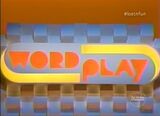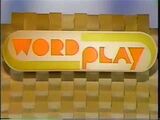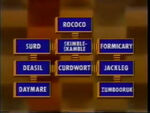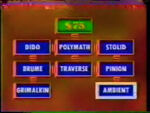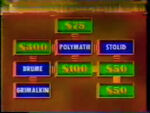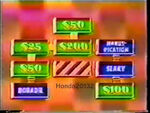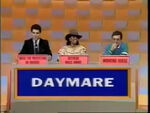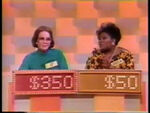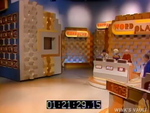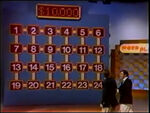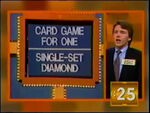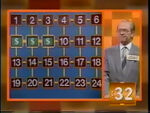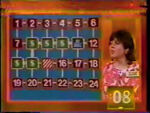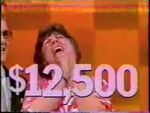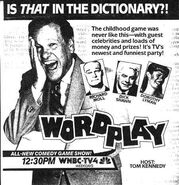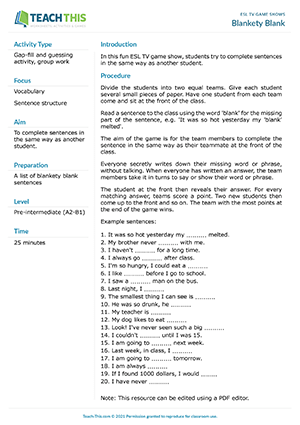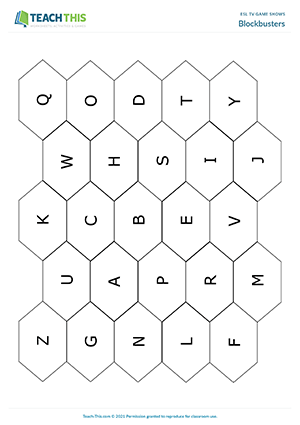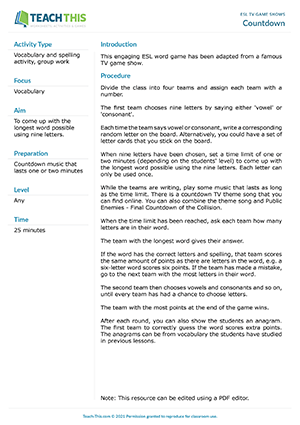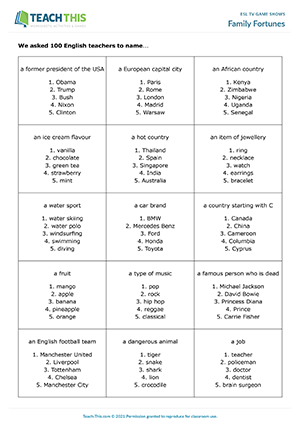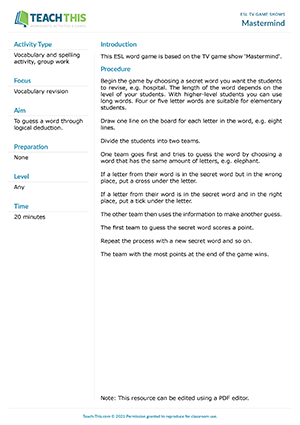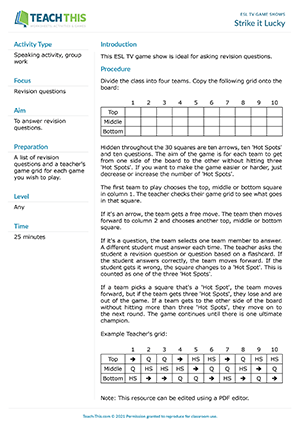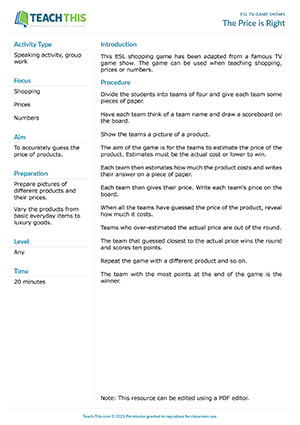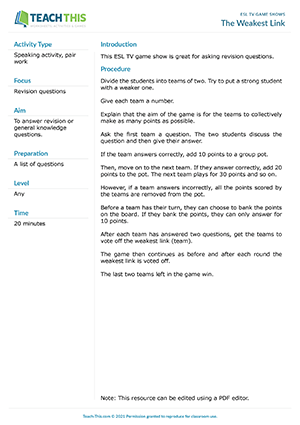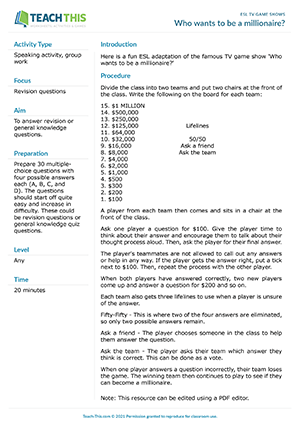From Wikipedia, the free encyclopedia
| Wordplay | |
|---|---|

Wordplay logo |
|
| Genre | Game show |
| Presented by | Tom Kennedy |
| Narrated by | Charlie O’Donnell |
| Theme music composer | David Reilly & John Devereaux (Pilot theme) Level 22/Joel Jaffe[1] (Series theme) |
| Opening theme | Hitting Home (Pilot theme)[2] |
| Production | |
| Production locations | NBC Studios Burbank, California |
| Running time | 22 minutes |
| Production companies | Fiedler-Berlin Productions Rick Ambrose Productions Scotti Bros.-Syd Vinnedge Television |
| Release | |
| Original network | NBC |
| Original release | December 29, 1986 – September 4, 1987 |
Wordplay is an American game show which ran on NBC from December 29, 1986 to September 4, 1987. It was hosted by Tom Kennedy, with Jamie Farr substituting for Kennedy for one week of shows, and announced by Charlie O’Donnell. The show was produced by Scotti Vinnedge Television in association with Fiedler/Berlin Productions and Rick Ambrose Television.[3]
When it premiered on December 29, 1986 Wordplay was slotted in the 12:30 pm/11:30 am timeslot following Super Password. That slot had been occupied by the soap opera Search for Tomorrow for over four and a half years on NBC; the serial had aired continuously, first on CBS, since 1951 and was the longest running daytime program in history at the time of its cancellation.[4]
Main game[edit]
Two contestants, one usually a returning champion, competed through three rounds to win money by guessing the definitions of unusual words. The gameboard consisted of a 3-by-3 grid of words, with the middle column shifted one level above the others. The contestant in control chose a word, and three celebrity panelists each gave a possible definition with an accompanying humorous anecdote. Panelists were provided with definitions before the show.[5] If the contestant chose the correct definition, he/she won money; an incorrect choice gave the opponent a chance to steal the value with a correct guess.
Two words were played per round, with each contestant choosing one. The champion (or the contestant on the left, if there was no returning champion) played first in round one, the challenger in round two, and the trailing contestant (or, in case of a tie, the left contestant) in round three. Words were worth $25, $50, or $75 in round one; these values doubled in round two, and again in round three. Every word was horizontally and vertically connected to its immediate neighbors. Guessing a correct definition won not only the money for that word, but also the total of all values to which it was connected. For example, a $75 word connected to an already-defined $50 word would award $125 to the contestant who won it ($75 + $50). If a $150 word connected to either of these two values was guessed in a later round, it would award $275 ($150 + $75 + $50). If both contestants missed a word, a block was placed on the board in that location and all connections to it were broken.
One word per game was designated as the day’s bonus word. Choosing this word and guessing its definition correctly awarded a bonus prize to the contestant, usually if not always a vacation, which was his/hers to keep regardless of the game’s outcome.
The contestant with the higher total after three rounds became the champion, kept his/her accumulated money, and advanced to the bonus round. If the game ended in a tie, a seventh word was played, selected by the champion (or the contestant on the left). Each celebrity gave a brief definition with no accompanying story, and the champion had the option to either play the word or pass it to the challenger. A correct guess won the game, while an incorrect guess gave the victory to the opponent.
Double Definitions[edit]
The day’s champion advanced to the Double Definitions bonus round for an accumulating cash jackpot. The round was originally titled «Speedword» for the first week, but was quickly changed once the producers realized that fellow NBC game show Scrabble had been using the term for more than two years at the time. The gameboard for this round was a grid of 24 numbered spaces, in four rows of six, with each space vertically and horizontally connected to its immediate neighbors. When the champion called a number, Kennedy read two definitions for a word (such as «Writing Implement/Animal Enclosure» for the word «pen»). Guessing the word awarded control of that space, while passing put up a block that the champion would have to go around. Multiple guesses were allowed with no penalty; the champion could move off a space only by giving a correct response or passing.
The champion had 45 seconds to complete a path connecting the left and right sides of the board. Doing so won the jackpot, which began at $5,000 and increased by $2,500 for every day it went unclaimed. Failing to complete the path won $100 per correct answer. The largest jackpot awarded on the show was $27,500, which occurred during the final week on the air.[6]
Contestants were allowed to stay for three consecutive days or until they were defeated, whichever came first.
Broadcast history[edit]
Wordplay premiered on December 29, 1986, three days after the finale of Search for Tomorrow, and inherited the soap opera’s 12:30 p.m. Eastern timeslot. The series faced off against the first half-hour of the highly-rated The Young and the Restless on CBS and Loving on ABC, and did not perform well against both soap operas. NBC announced the cancellation of Wordplay in the summer of 1987 in order to make room for Win, Lose or Draw on the network’s schedule; the final episode of the series aired on September 4, 1987. Three days after the final episode aired, Scrabble was moved to the 12:30 p.m. Eastern timeslot.
The series exists in its entirety and is in the possession of Fremantle, which inherited the rights to the series from its predecessor company Pearson Television, which in turn acquired those rights through the acquisition of Scotti Vinnedge Productions’ parent All American Television.
Prior to 2017, Wordplay had not been seen on television since its cancellation by NBC, but episodes circulated on YouTube through private collectors. Additionally, the series was one of six considered for a Sunday night slot on Buzzr called «Pick & Play» in the fall of 2015, but failed to generate enough votes from viewers to make it on the schedule. The series was later set to begin airing regularly on Buzzr two years later, in September 2017, only to be pulled by the channel after two days and replaced by Match Game.
The pilot episode, shot in October 1986 for NBC, featuring Peter Tomarken as host and Rod Roddy as announcer, also exists. Highlights from the pilot were featured by Wink Martindale as part of his ongoing «Wink’s Vault» series on YouTube, and it was later shown in its entirety as part of a Buzzr «Lost and Found» marathon in September 2017. This episode features a different layout for the word grid (a 4-by-3 rectangle with three blocks already in place) and a different theme song. The pilot theme was Hitting Home, composed by British composers David Reilly & John Devereaux and released as part of the KPM Music library.
References[edit]
- ^ «Music | J. Jaffe Music».
- ^ David Reilly & John Devereaux, «Hitting Home», KPM Music Group, Achievers (track 3), KPM 1348, 1985.
- ^ «Wordplay». 1987. Event occurs at Production slate occurs at 21:50. NBC.
- ^ TV Guide Guide to TV. Barnes and Noble. 2004. pp. 707. ISBN 0-7607-5634-1.
- ^ Disclaimer present in the closing credits of every single Wordplay episode, beginning with the premiere on December 29, 1986; «Celebrities were furnished definitions in advance».
- ^ Wordplay episode 178, aired September 2, 1987.
External links[edit]
- Wordplay at IMDb
| Hosts |
| Peter Tomarken (Pilot) Tom Kennedy (Series) Jamie Farr (1987, sub) |
| Announcers |
| Rod Roddy (Pilot) Charlie O’Donnell (Series) |
| Broadcast |
|
Pilot: 10/12/1986 NBC Daytime: 12/29/1986 – 9/4/1987 |
| Packagers |
| Scotti-Vinnedge Productions Fiedler-Berlin Productions Rick Ambrose Productions |
PILOT OPENING SPIEL:
«Could Pat Sajak hitch his «OXYMORON» to a cart? When Betty White goes «DINGBAT» hunting, does she use a net? Is Stuart Pankin’s «KISMET» listed in the telephone book? We’ll find out the answer to those questions and a lot more as we play television’s funniest new game show… WORDPLAY! And here’s your host, the man of many words, PETER TOMARKEN!»
SAMPLE OPENING SPIEL:
«Did Bert Convy have trouble in «POLYMATH» while going to school? If Abby Dalton met a «GRIMALKIN», would it be love at first sight? When Bill Rafferty sees a «BRUME» does he immediately clean his house? We’ll find out the answers to these questions and a lot more, as we play television’s funniest (new) game show… WORDPLAY! And here’s the star of Wordplay, that man of many words, TOM KENNEDY!
Wordplay was a game of words & definitions. It was a show where two contestants faced a panel of three celebrities who gave definitions to wacko & unusual words. The words were all found in Webster’s 3rd New International Dictionary.
Gameplay[]
Main Game[]
The game was played with two contestants (the returning champion who sat in the red podium, and the challenger who sat in the yellow podium) and a game board of nine words (the middle column was raised higher than the outer columns). The object of the game was to figure out the definitions to those words. The player in control (starting with the champion or the red player) chose a word and the panel gave three possible definitions to that word (one definition per star) along with humorous stories about the definition. Once the definitions were given, the player had to then choose which definition was correct. A correct choice won a money amount hidden behind the word, but an incorrect choice gave the opponent a chance to choose from the remaining definitions. If the word chosen was connected to previously revealed dollar amounts, the contestant won the combined total of all connected money amounts; if both contestants chose a wrong definition, a block went up and all connections to it were dead. The game was played in three rounds of two words each (meaning that they’ll be finding out the definitions to six of the words), and at the beginning of each new round, the unrevealed money amounts were doubled.
Here are the money amounts for each round:
| Round | Amounts | ||
|---|---|---|---|
| 1 | $25 | $50 | $75 |
| 2 | $50 | $100 | $150 |
| 3 | $100 | $200 | $300 |
In addition to the cash, one of the words in the game was a bonus word. The player who picked that and chose the right definition not only won the hidden dollar amount, but also a trip.
The player with the most money at the end of Round 3 won the game and kept the cash. If the game ended in a tie, one last word was played. The celebrities did not give wild stories this time around; they only gave straight definitions. The champion who selected that word could choose to either go for the right definition or pass it to his/her opponent. The correct definition choice won the game, but an incorrect definition gave the opponent the hidden money and the game. The winner of the game won the right to play Double Definitions for a cash jackpot that started at $5,000 and grew by $2,500 for every day it was not won.
The Wordplay game board
The glowing box on the lower left indicates that the word chosen is the bonus word.
Five words were played and three of amounts showing are connected.
The end of the game. Notice that the bottom box in column two turned into a block.
The Wordplay panel area with the chosen word superimposed on the desk.
The Wordplay contestant area
Double Definitions (Bonus Round)[]
In the Double Definitions round, the winning player faced a game board of 24 connected boxes numbered 1-24. Behind each box were two definitions to one single word (Ex: Hall Person/Special TV Screen, the word would be monitor). The object of this game was to connect from the left side of the board to the right (ala Blockbusters’ Gold Rush/Run) in 45 seconds or less. The champion chose a box and exposed the two definitions behind it; he/she could take as many guesses as needed and as soon as they guessed the right word, a dollar sign ($) appeared in that box and he/she moved on to the next. If the contestant passed on a box, a block went up, and the contestant had to then work his/her way around it. Each correct word/captured box was worth $100, and making the connection won the jackpot. The highest jackpot won was $27,500, and the series’ final jackpot won was $7,500.
On the first show, Double Definitions was called Speedword. They renamed it Double Definitions realizing that another game show, Scrabble, already had that name.
The set is turning from the main game monitor to…
The Double Definitions Game Board
A pair of definitions being deciphered.
Contestant Lonnie Burr of the Mouseketeers is halfway across the board.
Here’s another contestant Diane Magin who’s one away from winning.
A $12,500 WIN!!!!!
Champions stayed on the show until they lost the main game or won three times.
Gallery[]
Print Ad
Press Release[]
Page 1 of the Press Release sent out to NBC affiliates. This one describes the show, as well as gives a brief bio of host Tom Kennedy.
Page 2 of the Press Release sent out to NBC affiliates. This one talks about the announcement that the series was sold, the Halloween connection, and the fact that Wordplay was based on a parlor game.
Page 3 of the Press Release sent out to NBC affiliates. This one talks more about the Halloween connection, and Fiedler & Berlin’s past two attempts at a game show. Notice the mention of the pilot episode, but without the mention of its host, Peter Tomarken.
Last Page of the Press Release sent out to NBC affiliates. This one gives the complete credits for the premiere week.
Tickets[]
Ticket
Probably the ticket to the very last taping of the show.
Pilot Pictures[]
Rating[]
Music[]
Pilot — «Hitting Home» — by David Reilly & John Devereaux
Series — Level 22
Studio[]
NBC Studio 4, Burbank, CA
Trivia[]
- Wordplay replaced the long-running soap opera Search for Tomorrow, which moved to NBC from CBS.
- One memorable contestant was former Mickey Mouse Club Mouseketeer Lonnie Burr, who won more than $1,000 on his two appearances. When he lost on his second day, the panel wore Mouseketeer ears and sang the Mickey Mouse Club end theme as their way of saying goodbye.
- This was the last game show hosted by Tom Kennedy.
- The show’s pilot was hosted by Press Your Luck’s own Peter Tomarken and announced by his Press Your Luck & Hit Man announcer/companion Rod Roddy.
- Syd Vinnedge, the producer of the show, would go on to become the president of FremantleMedia.
- Aside from the pilot, Wordplay was aired as a regular series on Buzzr for just three days in September 2017, then abruptly pulled off the schedule. Rick Ambrose, who worked on the show, mentioned on Buzzr’s Facebook page that the series is not 100% owned by FremantleMedia. 50% is owned by Fiedler Berlin Productions and a company that had a board game on which the series was based.
Similar Shows[]
Call My Bluff – Similar show produced by Goodson-Todman Enterprises
Oh My Word – Similar show aired locally & nationally from 1965 to 1967
Take My Word For It – Similar show that is a revival of Oh My Word; aired in syndication from 1982 to 1983
Additional Page[]
Wordplay/Episode Guide
Links[]
Wordplay @ Adam Nedeff’s Game Show Utopia
Wordplay @ tv-gameshows.com
David Livingston’s Wordplay Page
YouTube Videos[]
Clips of the Pilot
Opening to the Premiere Show
A playing of the first round uploaded by a former champion.
The playing of the final Double Definitions of the series.
- TV Series
- 2009–
- 50m
A gameshow where contestants must solve various word puzzles to win a cash prize.A gameshow where contestants must solve various word puzzles to win a cash prize.A gameshow where contestants must solve various word puzzles to win a cash prize.
See production, box office & company info
Episodes31
Photos
Contribute to this page
Suggest an edit or add missing content
Edit pageAdd episode
More to explore
Recently viewed
You have no recently viewed pages
Wordplay — простая головоломка для поиска слов, но даже простые словесные игры могут поставить вас в тупик. Не волнуйтесь, мы здесь, чтобы помочь вам найти ответы, которые вы ищете. Не надо благодарить нас. Это просто, наша работа.
Покупка подсказки в Wordplay стоит больших денег. Сохраните свои монеты для последующих уровней и позвольте нам помочь вам бесплатно. Просто найдите нужный уровень из списка. Так или иначе, наша команда предоставит вам прохождение головоломки, которое вы ищете.
Следуйте нашим советам, чтобы привести свой мозг в порядок и развить навыки Wordplay:
Wordplay начинается с двух знакомых достопримечательностей для любого игрока в слова: набор пробелов и набор букв. Соедините буквы, чтобы составить слова (отсюда и броское название) и заполните пробелы. Заполните все пробелы, и вы перейдете на следующий уровень. В игре есть сотни, а не тысячи уровней, чтобы играть. Теперь вы рады, что сохранили свои монеты с помощью нашего сайта!
Wordplay Ответы
1 2 3 4 5 6 7 8 9 10 УРОВЕНЬ
11 12 13 14 15 16 17 18 19 20 уровень
21 22 23 24 25 26 27 28 29 30 уровень
31 32 33 34 35 36 37 38 39 40 уровень
41 42 43 44 45 46 47 48 49 50 уровень
51 52 53 54 55 56 57 58 59 60 уровень
61 62 63 64 65 66 67 68 69 70 уровень
71 72 73 74 75 76 77 78 79 80 уровень
81 82 83 84 85 86 87 88 89 90 уровень
91 92 93 94 95 96 97 98 99 100 уровень
101 102 103 104 105 106 107 108 109 110 уровень
Blankety Blank
ESL TV Game Show — Grammar and Vocabulary: Gap-fill, Sentence Completion, Guessing — Group Work — Pre-intermediate (A2-B1) — 25 minutes
In this fun ESL TV game show, students try to complete sentences in the same way as another student. One student from each team comes and sits at the front of the class. Read a sentence to the class using the word ‘blank’ for the missing part of the sentence, e.g. ‘It was so hot yesterday my ‘blank’ melted’. The aim of the game is for the team members to complete the sentence in the same way as their teammate at the front of the class. Everyone secretly writes down their missing word or phrase, without talking. When everyone has written an answer, the team members take it in turns to say or show their word or phrase. The student at the front then reveals their answer. For every matching answer, teams score a point. Two new students then come up to the front and so on. The team with the most points at the end of the game wins.
Blockbusters
ESL TV Game Show — Vocabulary: Guessing Vocabulary from Clues — Group Work — Intermediate (B1-B2) — 25 minutes
This ESL vocabulary game comes from an English TV game show. The game can be used as a general knowledge quiz or to revise vocabulary. Draw a five-by-five hexagon on the board. Write a different letter of the alphabet in each hexagon. The two teams then decide which direction they want to play — top to bottom or left to right. The aim of the game is to connect the hexagons from one side of the grid to the other. Tell the students that this is a fairly strategic game, and they need to choose their moves carefully in order to win the game, blocking the other team when necessary. Start with the center hexagon. Give a clue for the letter in the hexagon, e.g. if the letter was B, the clue might be: A person who bakes bread. The two teams then race to answer, e.g. baker. The first team to answer correctly wins the hexagon and it is coloured accordingly. The winning team then chooses the next hexagon. Give a clue for the letter in that hexagon, and both teams race to answer as before. The first team to connect their hexagons from top to bottom or left to right wins the game.
Countdown
ESL TV Game Show — Vocabulary and Spelling: Forming Words from Letters — Group Work — Any Level — 25 minutes
This engaging ESL word game has been adapted from a famous TV game show. The first team chooses nine letters by saying either ‘vowel’ or ‘consonant’. Each time the team says vowel or consonant, write a corresponding random letter on the board. Alternatively, you could have a set of letter cards that you stick on the board. Next, set a time limit of one or two minutes (depending on the students’ level) for teams to come up with the longest word possible using the nine letters. Each letter can only be used once. While the teams are writing, play some music that lasts as long as the time limit. Afterwards, the team with the longest word gives their answer. If the word has the correct letters and spelling, that team scores the same amount of points as there are letters in the word, e.g. a six-letter word scores six points. If the team has made a mistake, go to the next team with the most letters in their word. The second team then chooses vowels and consonants and so on, until every team has had a chance to choose letters. The team with the most points at the end of the game wins.
Family Fortunes
ESL TV Game Show — Vocabulary: Guessing — Group Work — Intermediate (B1) — 25 minutes
This fun ESL TV quiz game is adapted from a famous television game show with the same name. The aim of the game is for a team to guess the top five answers to a survey. If they do this, they win the round and score 100 points. Each round begins with one member from each team coming to the front of the class and trying to guess a top five answer to a survey question. The first student to give a top five answer can choose for their team to play or pass, depending on the difficulty of the category. The students in the playing team then take it in turns to guess the other top five answers. The playing team gets three lifelines per round. If an answer is not in the top five, the team loses a life. When this happens, draw a big X in one of the three boxes and say the phrase ‘Uh-uhhh.’ If a team loses all three lives, the other team has one chance to name one of the other top five answers. If they manage to do this, they steal the round and win all the points. If not, the team that gave the three incorrect answers scores 20 points for each answer they got right. The game is then repeated with a new survey question. The family with the most points at the end of the game wins.
Mastermind
ESL TV Game Show — Vocabulary And Spelling: Guessing — Group Work — Any Level — 20 minutes
This ESL word game is based on the TV game show ‘Mastermind’. Begin the game by choosing a secret word you want the students to revise, e.g. hospital. The length of the word depends on the level of your students. Draw one line on the board for each letter in the word, e.g. eight lines. One team goes first and tries to guess the word by choosing a word that has the same amount of letters, e.g. elephant. If a letter from their word is in the secret word, but in the wrong place, put a cross under the letter. If a letter from their word is in the secret word and in the right place, put a tick under the letter. The other team then uses the information to make another guess. The first team to guess the secret word scores a point. Repeat the process with a new secret word and so on. The team with the most points at the end of the game wins.
Strike it Lucky
ESL TV Game Show — Grammar and Vocabulary: Answering Questions — Group Work — Any Level — 25 minutes
This ESL TV game show is ideal for asking revision questions. Draw the game grid on the board. Hidden throughout the 30 squares are ten arrows, ten ‘Hot Spots’ and ten questions. The aim of the game is for each team to get from one side of the board to the other without hitting three ‘Hot Spots’. The first team chooses the top, middle or bottom square in column 1. The teacher checks their game grid to see what goes in that square. If it’s an arrow, the team gets a free move, moves forward to column 2 and chooses another top, middle or bottom square. If it’s a question, the team selects one team member to answer. The teacher asks the student a revision question or question based on a flashcard. If the student answers correctly, the team moves forward. If not, the square changes to a ‘Hot Spot’. This is counted as one of the three ‘Hot Spots’. If a team picks a square that’s a ‘Hot Spot’, the team moves forward, but if the team gets three ‘Hot Spots’, they lose and are out of the game. If a team gets to the other side of the board without hitting more than three ‘Hot Spots’, they move on to the next round. The game continues until there is one ultimate champion.
The Price is Right
ESL TV Game Show — Vocabulary: Estimating — Group Work — Any Level — 20 minutes
This ESL shopping game has been adapted from a famous TV game show. The game can be used when teaching shopping, prices or numbers. Show the teams a picture of a product. The aim of the game is for the teams to estimate the price of the product. Estimates must be the actual cost or lower to win. Each team then estimates how much the product costs and writes down their answer. Each team then gives their price. Write each team’s price on the board. When all the teams have guessed the price of the product, reveal how much it costs. Teams who over-estimated the actual price are out of the round. The team that guessed closest to the actual price wins the round and scores ten points. Repeat the game with a different product and so on. The team with the most points at the end of the game is the winner.
The Weakest Link
ESL TV Game Show — Speaking: Answering Questions — Pair Work — Any Level — 20 minutes
This ESL TV game show is great for asking revision questions. Explain that the aim of the game is for the teams to collectively make as many points as possible. Ask the first team of two a question. The two students discuss the question and then give their answer. If the team answers correctly, add 10 points to a group pot. Then, move on to the next team. If they answer correctly, add 20 points to the pot. The next team plays for 30 points and so on. However, if a team answers incorrectly, all the points scored by the teams are removed from the pot. Before a team has their turn, they can choose to bank the points on the board. If they bank the points, they can only answer for 10 points. After each team has answered two questions, teams vote off the weakest link (team). That team is out of the game. The game then continues as before and after each round the weakest link is voted off. The last two teams left in the game win.
Who wants to be a millionaire?
ESL TV Game Show — Listening and Speaking: Answering Questions — Group Work — Any — 20 minutes
Here is a fun ESL adaptation of the famous TV game show ‘Who wants to be a millionaire?’ A player from each team comes and sits in a chair at the front of the class. Give one player a multiple-choice question for $100. Give the player time to think about their answer and encourage them to talk about their thought process aloud. Then, ask the player for their final answer. If the player gets the answer right, put a tick next to $100. Then, repeat the process with the other player. When both players have answered correctly, two new players come up and answer a question for $200 and so on. Each team also gets three lifelines to use when a player is unsure of the answer. Fifty-Fifty: This is where two of the four answers are eliminated, so only two possible answers remain. Ask a friend: The player chooses someone in the class to help them answer the question. Ask the team: The player asks their team which answer they think is correct. This can be done as a vote. When one player answers a question incorrectly, their team loses the game. The winning team then continues to play to see if they can become a millionaire.

